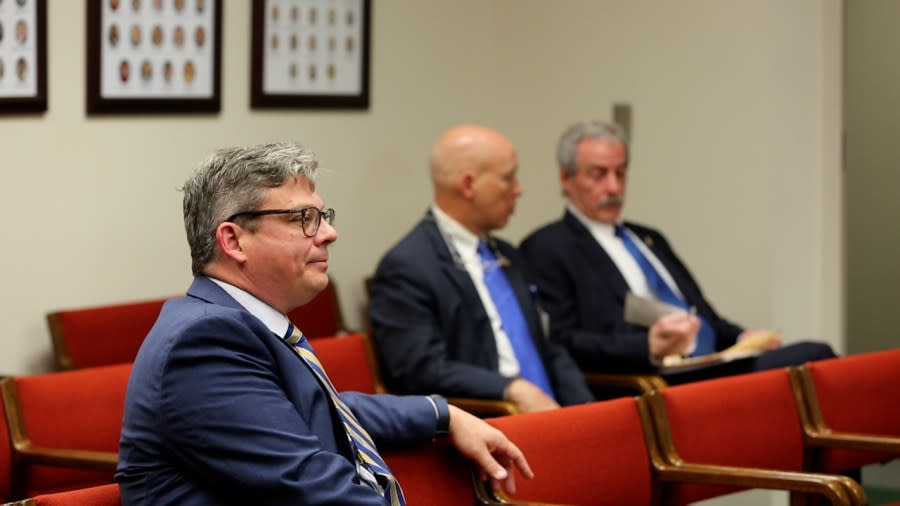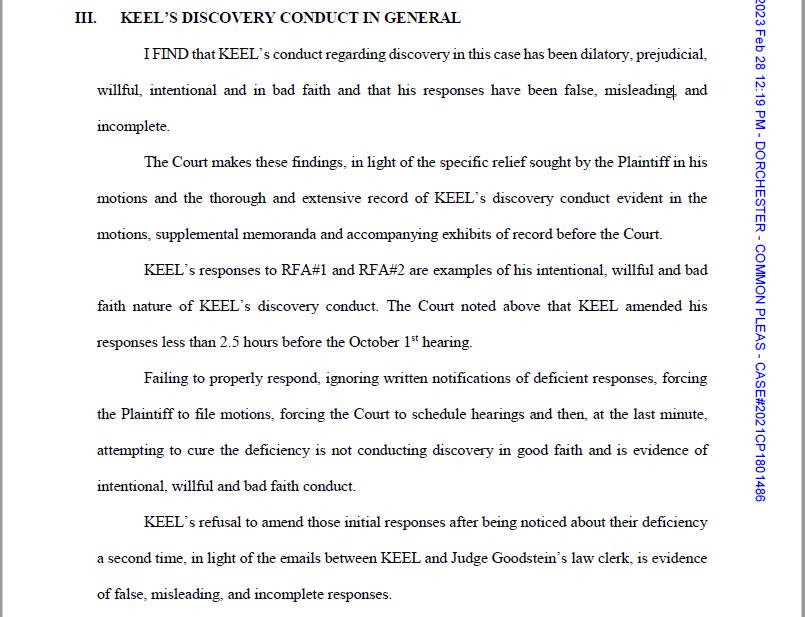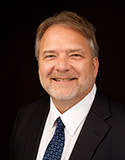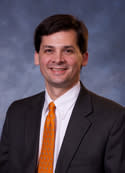UNDER OATH: SLED chief ‘categorically, absolutely’ denies committing discovery abuses in hemp farmer lawsuit

COLUMBIA, S.C. (QUEEN CITY NEWS) — Mark Keel spent most of the workday Wednesday testifying — under oath — before a subcommittee of the South Carolina Senate. Keel, currently the interim chief of the State Law Enforcement Division, hopes senators vote to confirm him to serve another six-year term as the head of the statewide police agency.
Gov. Henry McMaster appointed Keel to a third six-year term in December, but Keel doesn’t officially hold the title as the permanent SLED chief until the senate confirms him. That should happen before the legislative session ends in June.
For now, Keel is SLED’s interim chief.
Keel and the subcommittee spent 12 minutes in a question-and-answer session over a judge’s order sanctioning Keel for discovery abuses in a civil lawsuit Trent Pendarvis, a Dorchester County hemp farmer, filed against SLED and Keel stemming from SLED’s 2019 raid of Pendarvis’ hemp field.
Agents accused Pendarvis of unlawfully cultivating hemp and arrested him in September 2019, the day SLED raided his Harleyville hemp field and mowed down his crop. The First Circuit Solicitor’s Office dropped the charge on July 25, 2022, finding it had no evidence Pendarvis willfully violated the Hemp Farming Act.
The judge’s sanction order against Keel was handed down in February 2023.
WATCH: THE ENTIRE EXCHANGE BETWEEN SLED CHIEF MARK KEEL AND THE SENATE SUBCOMMITTEE CONCERNING THE DISCOVERY ABUSE SANCTION ORDER DURING THE APRIL 10, 2024, CONFIRMATION HEARING:
The 40-plus year career lawman defended himself during the April 10 State House hearing against Circuit Court Judge Maite Murphy’s order describing Keel’s conduct in the discovery phase of the farmer’s lawsuit as, ‘intentional, willful, and bad faith.”
Keel told senators that he had nothing to do with the discovery misconduct and that the judge got it wrong.
“Agency heads are not typically involved in discovery and in responding to those things. And I categorically, absolutely deny that I ever not responded to court or did not respond in the proper way or did not provide discovery, because, again, that was not something that I was involved in whatsoever,” Keel testified during the hearing.
Murphy’s order leveled an $11,307 sanction for discovery abuses against Keel – abuses the farmer’s lawyer called, “obstructionist discovery conduct meant to obstruct the plaintiff from getting discovery, it was also meant to mislead the plaintiff,” Patrick McLaughlin told Judge Maite Murphy during an Oct. 31, 2022, hearing.
02282023-KEEL-DISCOVERY-VIOLATIONS-ORDERDownload
Keel testified that although he is a named defendant in the lawsuit, he wasn’t personally involved in answering interrogatories or collecting evidence the farmer’s attorneys sought through discovery. Here’s a partial transcript of Keel’s exchange with Sen. Shane Massey, who chairs the subcommittee:
MASSEY: “Chief, before it gets to that level (of a sanction), the discovery requests are going to be served on your attorneys. And then when they’re not responded to within a certain period of time, and usually there’s some conversation going on between the lawyers, there’s going to be a motion filed with the court to compel your responses.”
KEEL: “That’s correct.”
MASSEY: “And before it ever gets to the position of imposing sanctions, the court is going to agree to that motion to compel. They’re going to issue an order compelling you to respond. Were you aware that the motion to compel had been filed?”
KEEL: “I was aware that the motion to compel had been filed, and we believed that we had provided the information that was requested. We had provided in a timely fashion and when we did a response to what ultimately ended up being the ruling of the court, we responded in a fashion that we believe was appropriate. And we also responded in the fact that I think was – it answered the questions that the court had asked and that they said we had not responded, and I think we showed the facts, that we had responded in a proper way.”
MASSEY: “But the judge disagreed.”
KEEL: “I understand that.”
Keel appeared to shift the blame for the discovery violations to SLED’s general counsel, Adam Whitsett, and to former attorney, Andrew Lindemann, who Keel replaced following the sanctions order. Lindemann was performing work on the lawsuit through the state’s Insurance Reserve Fund.

Here’s a continuation of the Keel/Massey exchange:
MASSEY: “Yeah, okay. But your attorneys at the time – and I understand that you’ve changed attorneys after that – but I guess what I was getting at was, were they in communication with you?”
KEEL: “They were not in communication with me personally. They were in communication with our staff. And when that – I don’t know if it was a motion or what that attorney McLaughlin filed, when I saw that – and of course – he had used my name in that filing every single time instead of what would have been an appropriate name, using the State Law Enforcement Division, because we were the ones that were sued, needless to say, I was not very happy about that.”
McLaughlin wasn’t the only court officer using the chief’s name in court filings. Keel’s name appeared 173 times throughout Judge Murphy’s 30-page sanctions order. Keel, as SLED’s agency head, was named as a defendant in the farmer’s lawsuit. In fact, Keel filed a motion days after Murphy’s order, asking the judge to remove his name and replace it with “South Carolina Law Enforcement Division.”
McLaughlin pointed out in his motion asking Murphy to deny Keel’s request that Keel and Lindemann “self-identified” Keel as “Defendant Keel in some form or fashion approximately 100 times,” in their own filings throughout the Pendarvis case.
Murphy denied Keel’s request to remove his name from her order.
Sen. Massey continued to press Keel for an answer about his role in the discovery misconduct related to the Pendarvis lawsuit. Keel eventually read a prepared statement as an answer to Massey’s questioning. Here’s a transcript of that exchange:
MASSEY: “I was just trying to get an understanding of what your participation has been throughout and what you were aware of —”
KEEL: “If you don’t mind me, let me just read this. I was named as a defendant in this action in my official capacity as chief of SLED. I was not personally involved in this case, and I certainly was not personally involved in discovery decisions in it. We engaged outside counsel and have attorneys to handle these matters. Any insinuation that I personally acted in bad faith or provided false, misleading, or incomplete discovery responses in any aspect of this case is not true. And I absolutely stand by that.”
MASSEY: “All right. Who would have been the — if the attorneys have issues on this, who is their point of contact? If it’s not you, who would they be dealing with?”
KEEL: “They’re dealing with my general counsel, Adam Whitsett, and of course, the attorney who is representing us through the Insurance Reserve Fund.”
CRIMINAL MISCONDUCT QUESTIONS
Sen. Brad Hutto launched into a line of questioning about whether an argument could be made that Keel might have committed misconduct, a criminal offense under Chapter 23 of the S.C. Code of Laws.
Hutto led into his questioning by telling the public, “In full disclosure,” he is one of the attorneys working with McLaughlin on Pendarvis’ lawsuit against Keel and SLED. Hutto has a private law practice in Orangeburg.
Hutto cited S.C. Code Sec. 23-23-150 which defines the 13 elements establishing misconduct in the Palmetto State. In subsection (g) of the statute, misconduct by a law enforcement officer includes, “willfully making, false, misleading, incomplete, deceitful or incorrect statements to any court.”
Judge Murphy used some of those exact words throughout her order sanctioning Keel in February 2023.

Hutto told Keel he understood Keel’s explanation that it was his own attorneys handling the discovery in the Pendarvis case, but that people had questioned Hutto about why Keel wasn’t charged with misconduct in office.
“I hear what you’re saying. You’re saying that that was not a Mark Keel decision to do that, that was a sort of SLED decision. I think, to the chairman’s point is like, where does the buck stop?” Hutto asked the interim SLED chief.
Aside from his SLED job, Keel also chairs the state’s Law Enforcement Training Council, a public body that decides whether sworn law enforcement officers across the state can keep their law enforcement certification after an allegation of misconduct. The council routinely votes to strip law enforcement officers of their certifications.
SLED chief pays hemp farmer’s attorney $11,300 sanction for discovery misconduct in hemp farm raid
Losing a certification is a lifetime ban from law enforcement in South Carolina.
Here’s a transcript of that exchange between Hutto and Keel:
HUTTO: “I had several people, and obviously some of these people have been charged with misconduct and gone before you and they’re saying, ‘Well, if I got charged, why didn’t he get charged?’ And so if you could just address the notion that this; a finding by circuit court would raise the issue of misconduct in this in the sense of 23-23-150.”
KEEL: “Well, senator, I will, and I’ll just say this that, you know, never before, that I can remember in my career, have I been accused of doing anything like this. And I think that if you were to talk to all the circuit court judges that I’ve been involved with since my career started, they would tell you that one thing that’s most important to me is my integrity, my reputation for being honest. I think, you know, and you may not, obviously, you haven’t been a state agency head, but I have. We don’t get involved in answering these questions of cases that we’re not, you know, personally involved in. We’re not personally going out, making the arrests, serving a search warrant, you know, actually being involved in the cases. Our attorneys, along with the attorneys from Insurance Reserve Fund that are hired by us, end up responding to these admissions, responding to the motions, complaints, summons. And again, they don’t come to me and ask me questions about it because, again, they would talk to the agents, they would talk to the personnel that was involved in the case. And this is not unlike any other any other case.”
Keel told the panel that the Pendarvis sanction is a first for SLED since the founding of the agency in 1935.
“I can tell you, in the history of our agency, we’ve never had anything like this happen before. And again, quite frankly, we don’t agree with the finding, either,” he said.
KEEL: PLANNING FURTHER APPEALS
Keel had 30 days from Judge Murphy’s Feb. 28, 2023, sanctions order to pay McLaughlin the $11,307 sanction and to hand over additional discovery. If Keel didn’t comply with the order within the 30-day window, the chief risked being held in contempt of court.
But, at 4:07 p.m. on May 5, 2023, the 30th day, Keel and his attorney, Andrew Lindemann, filed an appeal of Murphy’s order with the South Carolina Court of Appeals. The farmer’s attorney argued SLED filed the appeal to further delay litigation.
The delay has already spanned three years.
“This appeal was intentionally filed right before that deadline for compliance to avoid the Appellant being in contempt of the trial court’s order and subject to further sanctions for that contempt. This appeal was intentionally filed in that improper manner despite this Court having previously instructed in Funny on the proper way to appeal such an order: be found in contempt pursuant to Tucker and appeal the contempt order,” McLaughlin wrote in the May 8, 2023, motion opposing the appeal.
“In a case in which the very order being appealed found Appellant (Keel) to have engaged in conduct that was dilatory, prejudicial, willful, intentional, false, misleading, incomplete and in bad faith, resulting in clear, convincing and substantial evidence that the Respondent was prejudiced by having to unnecessarily expend substantial time and resources, this improper and frivolous appeal itself warrants sanctions,” McLaughlin wrote to the appeals court.
The appeals court ultimately agreed with McLaughlin and handed down an order on July 10, 2023, dismissing Keel’s appeal. The court found Murphy’s order as “not immediately appealable.” The order cited three S.C. Supreme Court cases establishing legal precedence that discovery orders “are “interlocutory” and “not immediately appealable.”
Keel then asked the S.C. Supreme Court to review the appeals court decision. The high court denied Keel’s request, upholding the appeals court’s finding that Keel must first be held in contempt of Judge Murphy’s order before he can appeal it.
Keel paid the $11,307 sanction in late December.
However, during the confirmation hearing on Wednesday, Keel said he wasn’t finished appealing Murphy’s order, “And that’s why we appealed it. And so, again, it is still going on, as you know, and we’ll see, I guess, at Court of Appeals, or you know, we intend to appeal it right on up to the Supreme Court if necessary.”
Sen. Massey, who chairs the Judiciary subcommittee and who is also a practicing attorney, appeared to dispute the assertion that he had any further appeals options to overturn Murphy’s sanctions order earlier in the meeting: “It sounds like the Supreme Court’s made that decision?” Massey said to Keel.
At the beginning of the questions concerning the Pendarvis lawsuit, the subcommittee clerk read a document laying out the timeline of the Keel appeal, which included language showing Keel’s appeal of the sanction had run its course.
“Issues were appealed to the Court of Appeals and the South Carolina Supreme Court. The Supreme Court denied the petition for a writ of certiorari because the Court of Appeals correctly held that the discovery order was not immediately appealable,” the clerk read.
The interim SLED chief, who is also a licensed attorney himself, could not answer Massey’s question during the exchange about whether the appeals were settled law, “I don’t want to say, but Senator Hutto probably can answer some of these questions better than I can.”
Massey did not take that line of questioning any further.




The subcommittee voted unanimously to send a recommendation to confirm Keel to the full Senate Judiciary Committee. If the full committee votes to recommend Keel, the full senate will then hold a confirmation vote. Recognizing Keel is currently in an interim chief spot, Massey said the legislature would have to hold that confirmation vote before the current session ends in June.
Massey cautioned Keel that he could not give a timeline on when the next two steps in the confirmation process might happen.
For the latest news, weather, sports, and streaming video, head to Queen City News.

